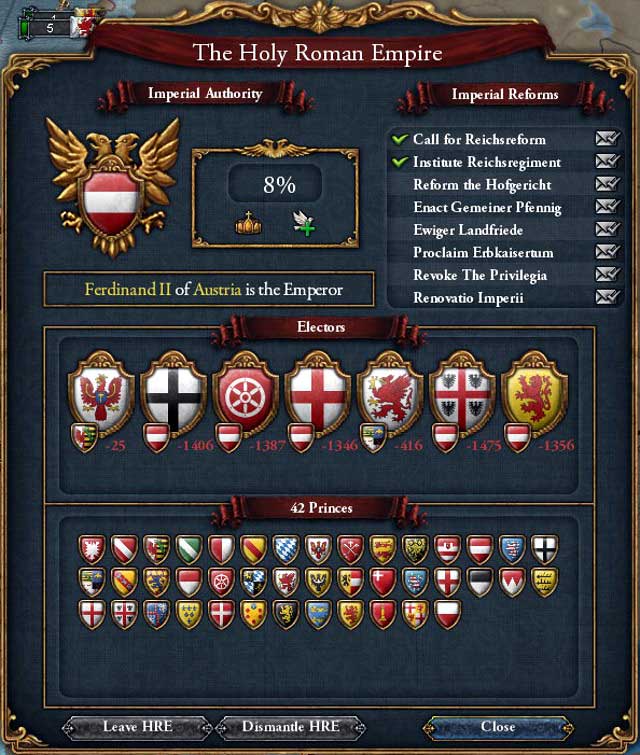Europa Universalis 4: Holy Roman Empire

The Holy Roman Empire is a unique union between Teutonic countries. The Empire consists of the Emperor, seven electors and a number of teutonic princes. The electors elect the Emperor and he gains access to special options. Although the Empire is a Union, of a kind, it is more of a loose partnership of autonomous states than the actual country. And so, the member states of the Empire can wage wars against each other.
Most of the times, throughout the game, the Austrian king will be the Emperor (Austria also has a bonus of +10% to the Imperial Authority, due to its national idea), but if you manipulate events with skill, you can cause a situation in which another country, also non- Teutonic, becomes the Emperor, or even the HRE is disbanded.
The fact of being the Emperor carries several bonuses:
- Spy Activity +5%
- Possible Advisors +1
- Diplomatic Relations+2
- Additional Leader
- Manpower increased by a half of the total number of members (e.g. 40 countries= 20 manpower)
- leaders without upkeep increased by a half of the total number of members(e.g. 40 countries= 20 limit)
- Annual prestige increased by a tenth of the half of the total number of members (e.g. 40 countries = 2 prestige). Additionally, prestige rises with each new emperor from the same country, which is to highlight the importance of dynasty.
- Casus belli against which country with lands within the boundaries of the Empire, and is not a member
Every male Christian ruler can become the Emperor, if he is a member of the HRE. The duty of the Emperor is to care about the unity and independence of the Empire. To fulfil his duties, the Emperor receives the following diplomatic actions:
- Bestow imperial grace - improves relations with the other members, used mainly to influence electors.
- Enforce religious unity - forces a member state to change its religion to the religion of the Emperor's country. Does not take effect on the electors. In the case of the remaining countries, success depends on relations, prestige, the size of the other country (the bigger the country the lower the chance) on distance between boundaries (the further away from the boundary the lower the chance). Successful enforcement is rewarded with increased Imperial Authority.
- Grant electorate - endows a member with the electoral title. Possible only in situations when a country ceases to be an elector. With each month when the number of electors is not full (7), you lose Imperial Authority so, you should endow someone with this title . Of course, you should choose an ally that knows perfectly who to vote for.
- Revoke electorate - a special Casus Belli against electors to deprive them of the right to vote and give it to another country.
- Demand unlawful territory - demand that a land that belongs to the Empire, but remains under control of a non-member who is not entitled to it (no core), be returned. Chances of success depend on the relation, prestige and the value of the province.
Furthermore, each member can seek help from the Emperor, while at war.
Who an elector is going to vote for, mainly depends on relations, Imperial Authority, prestige, legitimacy, the size of the country and trust (trust falls when you attack the other members, especially electors), but also on religion. An elector will never vote for a country with different religion so, while choosing your allies, remember to make sure that the electors are not Protestants, and do not become ones after the Reformation, if you are still playing in the XV century. In general, the Northern countries are more susceptible to changing religion than the ones in the South so, for a catholic Emperor it is safer to surround oneself with the countries from the South, and for protestant one from the North.
Authority and reforms

It is necessary that to take decisions, you have the Imperial Authority. You gain authority by:
- Helping member states at war.
- Victorious defensive wars against enemy countries.
- Converting members to the True Faith.
- Freeing the enslaved members
- Joining new provinces to the Empire
- Successive Emperors from the same country.
You lose Authority by:
- Denying pleas for help at war from members
- Decreasing the Empire in size
- Change of the religion by a member
Apart from bolstering chances for success in diplomatic actions, authority also gives you the opportunity to enact reforms in the Empire, to centralize it into a stronger entity, or even to unify it into one nation. You can find the list of reforms to the right of the Emperor's window. To introduce a reform, you need high authority and the support from members. After you point your mouse to a specific reform, you will learn who is in favor and who is against and why. Try to make up for the shortcomings by persuading the enemies to change their mind, and introduce the reform. You should also take into consideration the fact that each one of the members may declare war on the Emperor, to force reversing of a reform.
Each reform carries its effects, both on the Emperor and on the members. These are:
Call for Reichsreform:
1. For the Emperor:
Building cost -2%
Technology cost-2%
Yearly Prestige +2%
2. For the member states:
Building cost -2%
Technology cost -2%
Institute Reichsregiment:
1. For the Emperor:
Additional Diplomat
Diplomatic reputation+2
2. For the member states:
Diplomatic reputation -2
Reform the Hofgerichit:
1. For the Emperor:
Yearly Prestige +1%
Cost to Core -10%
2. For the member states:
Yearly Prestige -2%
Enact Gemeiner Pfening:
1. For the Emperor:
Global Tax Modifier +25%
2. For the member states:
Global Tax Modifier -5%
Ewiger Landfriede:
1. For the Emperor:
Stability Cost +10%
Annual Army Tradition -1
2. For the member states:
Stability Cost -10%
Annual Army Tradition -1
Forbids wars among member states.
Proclaim Erbkaisertum:
1. For the Emperor:
Annual authority +25%
2. For the member states:
-1 Diplomat
Reverses the Imperial Elections, each consecutive Emperor from the same country.
Evoke The Privilegia:
1. For the Emperor:
Diplomatic reputation -1
2. For the member states:
Diplomatic reputation -1
Each member of the empire becomes the Emperor's vassal. Ones that disagree will wage war against him.
Renovatio Imperii:
Unifies the Holy Roman Empire into one country!
Joining and Leaving
Being a member of the Holy Roman Empire comes with a special modifier - Imperial Integrity which decreases the Revolt Risk, the Stability Modifier by 3 and decreases the global technology cost by 10%. Due to the lower price of stability, sometimes it is worthwhile to join the Empire (westernization with an Eastern country). Although the HRE in reality means the German Reich, any Christian country can actually join it (provided it is not too big). To do that, you need the relations with the Emperor's country of, at least +190, and you need to border the Empire. Then, you can join the border provinces to the HRE in the province menu. Once you join the capital, the entire country will be under the protectorate of the Emperor. You can also leave the Empire at any time, in its menu, but this will have adverse effects on the relations.
There also is an option of destroying the Empire utterly. To do that, you need to take control over the electors and occupy the Empire's capital. Liquidating the HRE will come with a large boost of prestige - +100.
You are not permitted to copy any image, text or info from this page. This site is not associated with and/or endorsed by the developers and the publishers. All logos and images are copyrighted by their respective owners.
Copyright © 2000 - 2026 Webedia Polska SA for gamepressure.com, unofficial game guides, walkthroughs, secrets, game tips, maps & strategies for top games.
